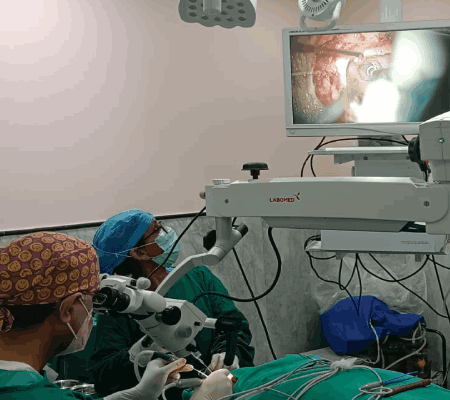Home / Mastoidectomy
ENT Surgery
Mastoidectomy: A Comprehensive Guide to Ear Surgery
Welcome to our comprehensive guide on mastoidectomy, a surgical procedure performed to treat various conditions of the middle ear. In this article, we will delve into the intricacies of mastoidectomy, exploring its purpose, procedure, recovery, potential risks and mastoidectomy cost.
What is Mastoidectomy?
Mastoidectomy is a surgical procedure that involves removing infected or damaged tissue from the mastoid bone, a prominent bone behind the ear. The mastoid bone contains a network of air cells that connect to the middle ear. When these air cells become infected or inflamed, it can lead to complications such as chronic ear infections, cholesteatoma, or the spread of infection to nearby structures.
It is also used to remove other tissues from the temporal bone including tumours, cancers etc.
Closure of CSF leaks from the ear also need a mastoid surgery.

The Importance of Mastoidectomy
Mastoidectomy plays a crucial role in the treatment of various ear conditions, including:
Chronic Ear Infections
Chronic ear infections, also known as chronic otitis media, can cause persistent pain, hearing loss, and recurrent infections. When conservative treatments fail to address the underlying issue, mastoidectomy may be recommended to remove infected tissue and improve the condition.
Cholesteatoma
Cholesteatoma is an abnormal growth of skin cells in the middle ear. It can lead to erosion of the bones and structures in the ear, potentially causing hearing loss and other complications. Mastoidectomy is often necessary to remove the cholesteatoma and prevent further damage.
Complications of Acute Otitis Media
In some cases, acute otitis media, commonly known as an ear infection, can lead to serious complications such as mastoiditis or abscess formation. Mastoidectomy may be required to drain the abscess and remove the infected tissue, preventing the spread of infection.
Mastoidectomy Surgery

Types of Mastoidectomy
There are several types of mastoidectomy procedures, each tailored to address specific conditions and severity:
- Simple Mastoidectomy: This procedure involves the removal of infected tissue from the mastoid air cells, while preserving the hearing mechanism and other structures in the ear.
- Modified Radical Mastoidectomy: In cases where the infection has spread extensively, a modified radical mastoidectomy may be necessary. This procedure involves removing infected tissue, as well as some middle ear structures, to achieve complete eradication of the infection.
- Radical Mastoidectomy: A radical mastoidectomy is the most extensive form of the procedure, involving the removal of all mastoid air cells, the middle ear structures, and the eardrum. It is typically reserved for advanced cases or when the infection has spread beyond the middle ear. This is also done for Cancers of the middle ear.
The Surgical Process of Mastoidectomy
During mastoidectomy, an incision is made behind the ear – Post Aural incision (or in front and above the ear – Endaural incision) allowing the surgeon access to the mastoid bone and middle ear structures. The surgeon carefully removes infected tissue, cleans the area, and may reconstruct any damaged structures, depending on the extent of the procedure. A Tympanoplasty including an ossicular reconstruction may be done in order to reconstruct the eardrum as well as the middle ear ossicles. Once the surgery is complete, the incision is closed using sutures.
Recovery and Postoperative Care
Following mastoidectomy, you will be monitored in a recovery room until the anaesthesia wears off. You may experience some discomfort, swelling, or drainage from the surgical site, which is normal. Pain medications and antibiotics may be prescribed to manage pain and prevent infection. It is essential to follow your doctor’s postoperative instructions carefully, including keeping the surgical site dry and avoiding strenuous activities.
Potential Risks and Complications
As with any surgical procedure, mastoidectomy carries certain risks, although they are relatively rare. Potential complications may include:
- Infection
- Bleeding
- Damage to nearby structures
- Facial nerve injury
- Hearing loss
- Tinnitus (ringing in the ears)
- Dizziness or vertigo

Mastoidectomy FAQ - Frequently Asked Questions
Mastoidectomy is performed under general anaesthesia, ensuring that you won’t experience any pain during the surgery. However, some discomfort and pain can be expected during the recovery period, which can be managed with prescribed pain medications.
Mastoidectomy is performed under general anaesthesia, ensuring that you won’t experience any pain during the surgery. However, some discomfort and pain can be expected during the recovery period, which can be managed with prescribed pain medications.
The recovery time varies depending on the individual and the extent of the procedure. In general, it can take several weeks to fully recover from mastoidectomy. Your doctor will provide you with specific guidelines and recommendations for a smooth recovery.
The impact on hearing depends on the extent of the surgery and the underlying condition being treated. In some cases, hearing may improve after mastoidectomy, while in others, there may be a slight or moderate decrease in hearing ability. This will depend upon the nature and extent of the disease.
In some cases, alternative treatments such as medications or less invasive procedures may be considered before mastoidectomy. In some cases where the patient is not fit for anaesthesia your ENT surgeon may recommend conservative treatment, under regular follow up, to clean the infected areas in order to prevent complications.
Sometimes patients are reluctant to undergo a surgery for personal reasons – in this case as well they must go for regular check ups.
Address
D 3/14, Ground Floor
Vasant Vihar
New Delhi 110 057
Mobile: +91 98711 50032
Hour of Operation
Monday To Saturday
Morning Timing
09:30 AM to 11:30 AM
Evening Timings
4:30 PM to 7:00 PM
Thursday Morning Clinic Is Closed
Thursday Evening
4:30 PM to 7:00 PM
Let's Get In Touch. Contact us.
Get Connected

Get In Touch
Subscribe For Health Updates

